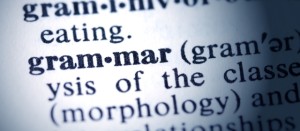
Writing errors: what do they say about you?
- Rope
- 0
- Posted on
 I tend to be annoyed by basic writing errors. They always seem to represent a lack of care, or a lack of intelligence, or both.
I tend to be annoyed by basic writing errors. They always seem to represent a lack of care, or a lack of intelligence, or both.
If the obvious and simple (if irrational) rules of the apostrophe aren’t followed, I conclude that the content of whatever I’m reading is likely to be as flawed as the form. I used to be kind of a dick, and I think the basic source of that was that I didn’t care about how other people felt.
I don’t have a personal problem with being called a Grammar Nazi – in the sense that it doesn’t hurt my feelings – but in the widening sense of social justice, it’s one of those things you probably shouldn’t say once you’ve thought about it for 5 minutes. It is a mistake to draw parallels between the irrational fury of seeing a misused apostrophe (or the gnawing space where one should be) and an attempt to systematically eradicate millions of marginalised people. The same can be said of the word “frape”, a portmanteau of “Facebook rape”, where an attempt is made to compare sexual assault to someone taking advantage of the thoughtless error of neglecting to log out of one’s Facebook account.
Common response to the criticism I am making here (and just to be entirely clear, I am absolutely criticising using the word “frape”, a word so frivolously ghastly that it has a pair of quote marks dropped around it like linguistic gloves used to handle nuclear isotopes) include accusations of oversensitivity, defences of hyperbole, irony, and free speech. Then I get slow, baffled looks and the sort of blank hostility used to exclude kids who are trying to be cool from the groups of kids they are trying to impress.
I’m not actually proposing to debate the idea that these idioms shouldn’t be used. That’s mainly because I suspect that anyone to whom this is not obvious after brief consideration will probably never agree. To those people I would say only this: we know the world is full of people, especially women, who have been sexually assaulted. Statistically speaking, you almost certainly know one or more. I doubt many of them wish to be reminded of that experience, or have it compared to a prank. You are free to say whatever you like. That comes with the responsibility, like all privilege, to be used to make the world at least no worse. Clinging to your freedom to say whatever you like, when it brings so little joy and potentially brings so much hurt, makes you a bad person.
Blankly thinking less of someone who makes writing errors makes me a bad person. Thoughtlessly waving them off as idiots, or their ideas as not worth my time, just shows the shortcomings of my character. There are situations in which one can reasonably expect a certain standard of written communication, but my mistake up until quite recently has been to judge a person to be below that standard, and not their writing. It’s just as dehumanising as the thoughtless disdain for victims that the word “frape” represents, but it comes from a place of smug, thoughtful superiority, and that makes it even worse.
Recently, the Dominion Post ran an op-ed piece from an Otago law professor, Rex Ahdar, on the topic of marriage equality. As far as I could tell there were no typos, all case and tense matched, and the possessive apostrophe was correctly used. I say “as far as I could tell” because I was too busy grappling with the monumental errors in argument that accompany any attempt to oppose marriage equality on secular grounds to proofread the piece for grammar (I suspect I’m tipping my hand quite a lot in this first entry, politically speaking).
I don’t think it’s too much to ask of anyone, including myself, to be kind as well as clever. If I had to choose only one, I’d rather be the former than the latter.

